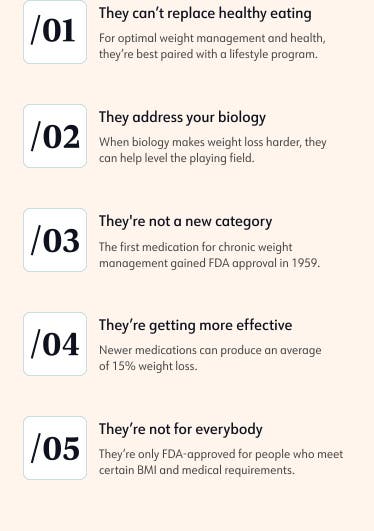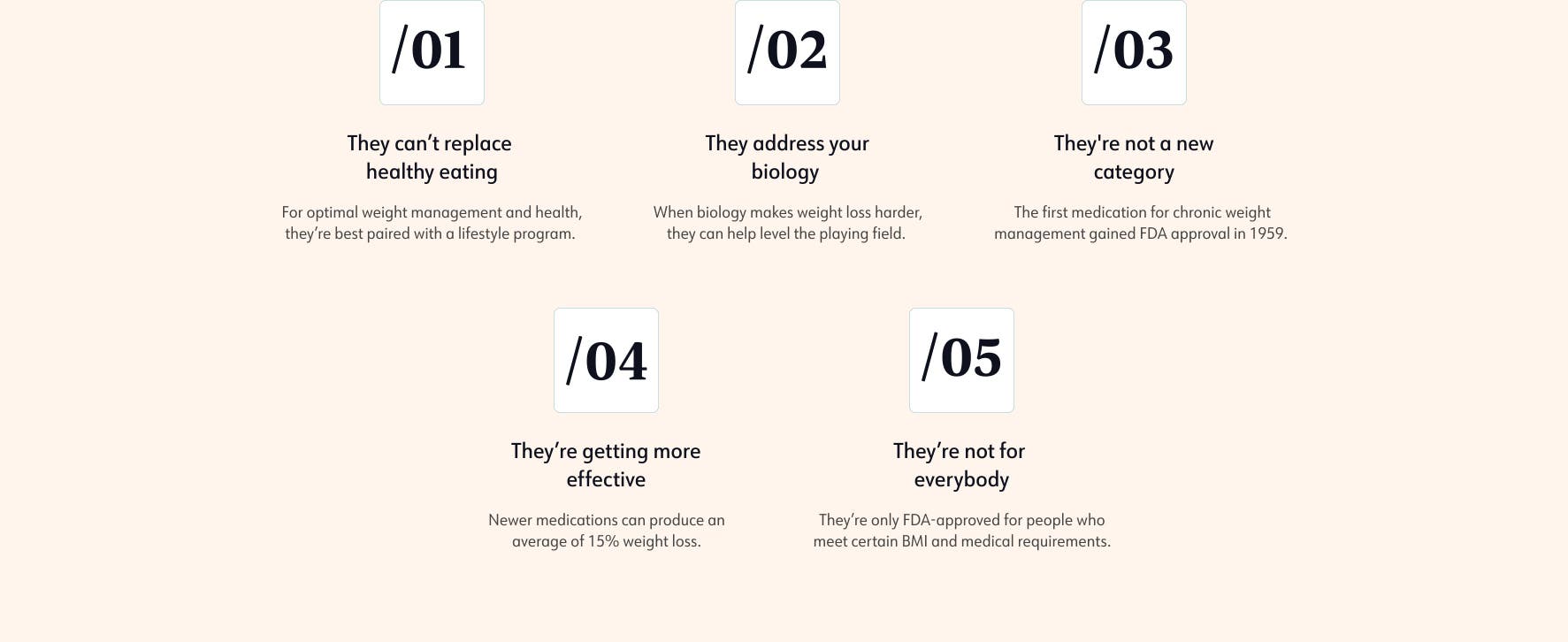Medical Weight-Loss Management | WW UK
Clinical weight management
A first-of-its-kind solution that incorporates prescription medications alongside WeightWatchers’ proven lifestyle program, powered by the digital health platform Sequence.


Weight loss isn’t one size fits all
Lifestyle lays the foundation for all healthy weight loss.
But for some people living with obesity, prescription medications may help too.
Surprising factors that influence obesity
It’s not just diet and exercise. Obesity is a complex disease with a multitude of root causes.

5 facts about chronic weight-management medication


Questions? We got you.
Rx cheat sheet
The FDA-approved medications to know for chronic weight management:
Liraglutide (Saxenda)
A once-daily injection approved for weight management.
Naltrexone-Bupropion (Contrave)
Twice-daily, extended-release tablets that combine two different medications.
Orlistat (Alli and Xenical)
Typically taken three times a day, this capsule prevents fat absorption in the intestines.
Semaglutide (Wegovy)
A once-weekly injection approved for weight management.
The trusted leader in sustainable weight loss
Over the last 60 years, we’ve stayed in lockstep with the latest research. When science evolves, we do too.
Everybody needs healthy habits
Prescription medications aren’t one-and-done wonder drugs. For long-term weight management, medical experts overwhelmingly recommend pairing them with a lifestyle program.
That’s where we come in.


Meet our medical advisers
The internet is full of self-appointed health experts. Our advisers are the real deal—with the credentials to prove it—and they’re helping to shape our future service.
Jamy Ard, M.D.
Codirector of Atrium Health Wake Forest Baptist Weight Management Center in Winston-Salem, North Carolina
Professor of epidemiology and prevention and medicine at Wake Forest University School of Medicine

Scott Kahan, M.D., MPH
Director of National Center for Weight and Wellness in Washington, D.C.
Angela K. Golden, D.N.P.
Doctor of nursing practice and owner of NP Obesity Treatment Clinic in Flagstaff, Arizona

Robert F. Kushner, M.D.
Director of Center for Lifestyle Medicine in Chicago
Professor of medicine and medical education at Northwestern University Feinberg School of Medicine in Evanston, Illinois
Ania Jastreboff, M.D., Ph.D.
Director of Yale Medicine Center for Weight Management in New Haven, Connecticut
Associate professor of medicine and pediatrics at Yale School of Medicine

Amanda Velazquez, M.D.
Director of obesity medicine at the Center for Weight Management and Metabolic Health at Cedars-Sinai Medical Center in Los Angeles
Jamy Ard, M.D.
Codirector of Atrium Health Wake Forest Baptist Weight Management Center in Winston-Salem, North Carolina
Professor of epidemiology and prevention and medicine at Wake Forest University School of Medicine

Scott Kahan, M.D., MPH
Director of National Center for Weight and Wellness in Washington, D.C.
Angela K. Golden, D.N.P.
Doctor of nursing practice and owner of NP Obesity Treatment Clinic in Flagstaff, Arizona

Robert F. Kushner, M.D.
Director of Center for Lifestyle Medicine in Chicago
Professor of medicine and medical education at Northwestern University Feinberg School of Medicine in Evanston, Illinois
Ania Jastreboff, M.D., Ph.D.
Director of Yale Medicine Center for Weight Management in New Haven, Connecticut
Associate professor of medicine and pediatrics at Yale School of Medicine

Amanda Velazquez, M.D.
Director of obesity medicine at the Center for Weight Management and Metabolic Health at Cedars-Sinai Medical Center in Los Angeles
WW has published 120+ clinical studies
The results are clear—WeightWatchers® delivers clinically significant weight loss that lasts.
Frequently asked questions
Right now, six medications are approved by the FDA: bupropion-naltrexone (brand name: Contrave), semaglutide (brand name: Wegovy), liraglutide, (brand name: Saxenda), orlistat (brand names: Alli and Xenical), phentermine-topiramate (brand name: Qysmia), and phentermine.
Ozempic is the brand name for a form of the GLP-1 drug semaglutide; right now it’s only FDA-approved to treat type 2 diabetes. That said, some physicians do prescribe it off-label for weight management. A higher-dose version of semaglutide, under the brand name Wegovy, is FDA-approved to treat obesity.
It depends on the medication and the type of insurance you have. Newer generation medications can be very expensive ($900-$1200 a month in the US for out-of-pocket costs), and insurance companies vary greatly on whether and how much they cover.
The quickie answer: most suppress your appetite. They do this by targeting your brain and gut to manage hunger and signal feelings of fullness.
Weight loss varies across medications, ranging from 5% to 15%, with newer medications producing the more significant results.
The consensus of the medical community—including both researchers and healthcare providers—is that lifestyle factors like food, activity, sleep, and mindset form the foundation for any weight-loss treatment, including prescription medication and even surgery. For people whose biology makes losing weight more challenging, medications help level the playing field—but they can’t make you eat healthier or move more or shift your mindset. Thus, experts say that these medications should be used as an adjunct to a lifestyle modification program.
We’ll leave medication recommendations to medical experts—we’re focused on creating the best weight-loss program for our members. You should consult with your healthcare provider to determine which, if any, chronic weight-management medications may be right for you.
All medications have side effects, and your healthcare provider should go over them if and when you discuss medication options. Common side effects include nausea, vomiting, diarrhea, and constipation, with most patients experiencing mild to moderate symptoms that are relatively short-term. More serious side effects are also possible, but far less common.
Sequence is a fast-growing digital health platform that WeightWatchers is acquiring. This will allow us to create an unparalleled clinical weight-management solution for members considering or already taking prescription medication, pairing our proven nutrition and behavioral program with ongoing, comprehensive access to clinical care.
That’s easy—it doesn’t! Your membership and your plan remain unchanged. Much like our Diabetes-Tailored Plan, it’s simply a new offering that we’re in the process of developing to meet the needs of our members.
We’re excited to bring this clinical weight-management solution to interested members as soon as possible. That said, we’re still fine-tuning the experience, including costs. Sign up for the wait list for more details.
Sequence is available to anyone in the US over the age of 18, but you must meet certain criteria to join, including: a BMI over 30 or a BMI over 27 with a qualifying condition (such as high blood pressure), and commercial insurance. Additionally, anyone who is pregnant, breastfeeding, or has a family history of medullary thyroid cancer is not a candidate.
